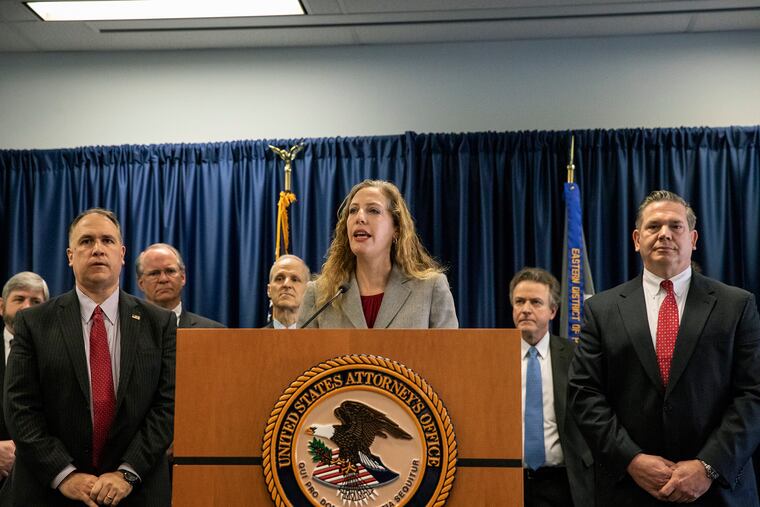How Philly can break the corruption cycle | Opinion
Four common-sense reforms that can change the way Philly politicians do business.

The recent charges against the Philadelphia region’s most powerful labor leader, Local 98′s John Dougherty, City Councilman Bobby Henon, and six others highlight the pressing need for action against the corruption that plagues our broken political system at all levels of government. The federal grand jury recently handed down a massive indictment with 116 counts of corruption-related charges including fraud and embezzlement.
Despite recent improvements in ethics oversight, hundreds of thousands of dollars in bribes to city officials keep council members working for the highest bidder, when they should be working for the people who elected them. It reflects studies that show the average American has little influence on the actions of politicians. For instance, a study done by Martin Gilens and Benjamin I. Page shows that no matter how much the public supports a law, even if it’s 100 percent of the population, there is only a 30 percent chance that Congress will pass it.
Corruption prevents the adoption of commonsense solutions to public policy challenges. Gerrymandered districts, broken election processes, and loose campaign finance and ethics laws skew political influence from the voter to special interest groups and the economic elites that line the pockets of politicians. We cannot expect to tackle the issues that matter most to Americans if we do not first fix our broken political system.
Fortunately, we have the power to make changes and progress is already underway. Last year, a burgeoning anticorruption movement scored a record number of wins; 2018 was the biggest year for political reform since Watergate, with 23 laws passed in cities and states across the country to curb gerrymandering, promote transparency, overhaul elections, and put political power back in the hands of the people.
Both in Philadelphia and in Harrisburg, politicians can join this trend and pass similar reforms. Here are some reforms that Pennsylvania legislators should adopt.
Approve public financing of campaigns
The Philadelphia City Council should allow voters to decide on a proposal for public financing of campaigns to incentivize politicians to work for the people, not monied interests. While City Council has made gains on anti-coordination rules between PACs and candidates, PAC limits should be lowered. Further, the current conflict of interest scandal implores the city to prohibit the “councilmanic prerogative” of deferring to district members on land use ordinances. The city should institute stricter transparency laws, particularly with regard to these land deals.
Adopt lobbyist gift ban
In Harrisburg, the Pennsylvania General Assembly should adopt a lobbyist gift ban for state and local officials that prevents special interests from plying lawmakers with vacations, concert and sports tickets, and expensive meals. Without such commonsense reforms, unethical pay-to-play transactions incentivize politicians to put the interests of lobbyists over those of their constituents.
End gerrymandering
State lawmakers should end gerrymandering. The Pennsylvania Supreme Court threw out the state’s 2011 maps as unfairly gerrymandered, but has yet to redraw districts. Anti-gerrymandering solutions, including an independent redistricting commission and a more transparent map drawing process, would remove the conflict of interest that arises when legislators are in charge of redrawing districts. It would allow voters to pick their politicians, instead of the other way around.
Implement ranked choice voting
At both the state and city levels, policymakers should implement ranked choice voting (RCV) to give voters the freedom to back their favorite candidates without helping elect their least favorite candidates. As David Daley notes in The Hill, this can be especially helpful in battlegrounds like Pennsylvania, where thin margins mean third-party candidates have a greater chance of “spoiling” elections. State law prevents cities from implementing RCV, but the Assembly could fix that.
Adopting these reforms would have a real impact on repairing our broken political system by changing the infrastructure of the system itself. They prevent backroom deals between lobbyists and politicians, clever redistricting practices designed to take power away from voters, and a reliance on a gridlocked, two-party system that fails to represent a country where a third of all citizens belong to neither party.
With input and support from conservatives, progressives, and everyone in between, my organization, RepresentUs has been working with communities across America to pass local Anti-Corruption Acts. This is part of a larger strategy to demonstrate the effectiveness of these solutions locally to strengthen the case for federal reform.
Contact your city officials and state lawmakers to urge them to pass these reforms. Philadelphians can put an end to the corruption unearthed in this latest scandal -- in the city and throughout the Commonwealth.
Josh Silver is the cofounder and director of RepresentUs, the nation’s leading right-left anti-corruption group. @representus.